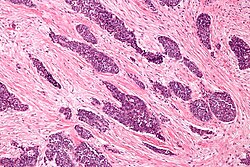Desmoplastic small-round-cell tumor

Editor-In-Chief: Prab R Tumpati, MD
Obesity, Sleep & Internal medicine
Founder, WikiMD Wellnesspedia &
W8MD's medical weight loss NYC, sleep center NYC
Philadelphia medical weight loss and Philadelphia sleep clinics
| Desmoplastic small-round-cell tumor | |
|---|---|

| |
| Synonyms | DSRCT |
| Pronounce | N/A |
| Specialty | N/A |
| Symptoms | Abdominal pain, abdominal mass, gastrointestinal obstruction |
| Complications | Metastasis, organ dysfunction |
| Onset | Typically in adolescence or young adulthood |
| Duration | Chronic |
| Types | N/A |
| Causes | Unknown |
| Risks | Male gender, young age |
| Diagnosis | Biopsy, immunohistochemistry, cytogenetics |
| Differential diagnosis | Ewing sarcoma, rhabdomyosarcoma, neuroblastoma |
| Prevention | N/A |
| Treatment | Surgery, chemotherapy, radiation therapy |
| Medication | N/A |
| Prognosis | Poor |
| Frequency | Rare |
| Deaths | N/A |
Desmoplastic small-round-cell tumor (DSRCT) is a rare, highly aggressive and malignant tumor that primarily occurs as a mass in the abdomen.
Epidemiology[edit]
DSRCT predominantly affects adolescents and young adults, with a higher incidence in males. The exact prevalence of DSRCT is unknown due to its rarity, but it is estimated to account for less than 1% of all sarcomas.
Pathophysiology[edit]
DSRCT is characterized by the presence of small, round, blue cells in a desmoplastic stroma. The tumor is thought to originate from primitive mesenchymal cells, although the exact cell of origin is still a subject of debate. The hallmark of DSRCT is a specific chromosomal translocation, t(11;22)(p13;q12), which results in a fusion of the EWSR1 gene on chromosome 22 and the WT1 gene on chromosome 11.
Clinical Presentation[edit]
Patients with DSRCT typically present with abdominal pain, distension, or a palpable mass. Other symptoms may include anorexia, weight loss, and ascites. Due to the aggressive nature of the tumor, most patients have widespread metastasis at the time of diagnosis, most commonly to the liver, lungs, and bones.
Diagnosis[edit]
The diagnosis of DSRCT is based on histopathological examination of the tumor, which shows small, round, blue cells in a desmoplastic stroma. Immunohistochemistry is used to confirm the diagnosis, with the tumor cells typically showing positivity for desmin, vimentin, and neuron-specific enolase. The presence of the EWSR1-WT1 fusion gene can be detected by fluorescence in situ hybridization (FISH) or reverse transcription polymerase chain reaction (RT-PCR).
Treatment[edit]
The treatment of DSRCT is challenging due to its aggressive nature and resistance to therapy. Treatment options include surgery, chemotherapy, and radiotherapy. Despite aggressive treatment, the prognosis of DSRCT is poor, with a 5-year survival rate of less than 20%.
Research Directions[edit]
Current research is focused on understanding the molecular mechanisms underlying the development and progression of DSRCT, with the aim of developing targeted therapies. Clinical trials are ongoing to evaluate the efficacy of novel treatments such as immunotherapy and molecularly targeted therapy.
Gallery[edit]
-
Desmoplastic small-round-cell tumor
-
Desmoplastic small-round-cell tumor
Ad. Transform your life with W8MD's Budget GLP-1 injections from $49.99


W8MD offers a medical weight loss program to lose weight in Philadelphia. Our physician-supervised medical weight loss provides:
- Weight loss injections in NYC (generic and brand names):
- Zepbound / Mounjaro, Wegovy / Ozempic, Saxenda
- Most insurances accepted or discounted self-pay rates. We will obtain insurance prior authorizations if needed.
- Generic GLP1 weight loss injections from $49.99 for the starting dose of Semaglutide and $65.00 for Tirzepatide.
- Also offer prescription weight loss medications including Phentermine, Qsymia, Diethylpropion, Contrave etc.
NYC weight loss doctor appointmentsNYC weight loss doctor appointments
Start your NYC weight loss journey today at our NYC medical weight loss and Philadelphia medical weight loss clinics.
- Call 718-946-5500 to lose weight in NYC or for medical weight loss in Philadelphia 215-676-2334.
- Tags:NYC medical weight loss, Philadelphia lose weight Zepbound NYC, Budget GLP1 weight loss injections, Wegovy Philadelphia, Wegovy NYC, Philadelphia medical weight loss, Brookly weight loss and Wegovy NYC
|
WikiMD's Wellness Encyclopedia |
| Let Food Be Thy Medicine Medicine Thy Food - Hippocrates |
Medical Disclaimer: WikiMD is not a substitute for professional medical advice. The information on WikiMD is provided as an information resource only, may be incorrect, outdated or misleading, and is not to be used or relied on for any diagnostic or treatment purposes. Please consult your health care provider before making any healthcare decisions or for guidance about a specific medical condition. WikiMD expressly disclaims responsibility, and shall have no liability, for any damages, loss, injury, or liability whatsoever suffered as a result of your reliance on the information contained in this site. By visiting this site you agree to the foregoing terms and conditions, which may from time to time be changed or supplemented by WikiMD. If you do not agree to the foregoing terms and conditions, you should not enter or use this site. See full disclaimer.
Credits:Most images are courtesy of Wikimedia commons, and templates, categories Wikipedia, licensed under CC BY SA or similar.
Translate this page: - East Asian
中文,
日本,
한국어,
South Asian
हिन्दी,
தமிழ்,
తెలుగు,
Urdu,
ಕನ್ನಡ,
Southeast Asian
Indonesian,
Vietnamese,
Thai,
မြန်မာဘာသာ,
বাংলা
European
español,
Deutsch,
français,
Greek,
português do Brasil,
polski,
română,
русский,
Nederlands,
norsk,
svenska,
suomi,
Italian
Middle Eastern & African
عربى,
Turkish,
Persian,
Hebrew,
Afrikaans,
isiZulu,
Kiswahili,
Other
Bulgarian,
Hungarian,
Czech,
Swedish,
മലയാളം,
मराठी,
ਪੰਜਾਬੀ,
ગુજરાતી,
Portuguese,
Ukrainian


